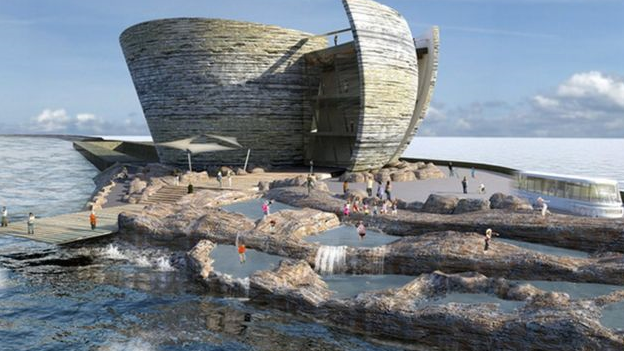MPs ponder meaning of £1bn DUP deal for Wales
- Published
- comments

Could the proposed Swansea Bay tidal lagoon be a beneficiary of the Conservative-DUP deal?
For Labour, it's a straight bung. For Plaid Cymru, it's a bribe.
The deal between Theresa May and the Democratic Unionists has prompted predictable howls of outrage over the commitment to spend £1bn over two years in Northern Ireland, some of which will be spent on health and education.
It's the equivalent of a 5% annual increase in the Northern Ireland Executive's budget.
Normally, when public spending in devolved areas increases in one part of the UK, it also goes up in other parts of the UK. But not this time. Hence the complaint from First Minister Carwyn Jones about "a straight bung to keep a weak prime minister and a faltering government in office".
'Unique'
The UK government says there are "unique circumstances" in Northern Ireland. It's talking about The Troubles rather than the fact that 10 Unionist votes give Theresa May a majority in the House of Commons.
Current Welsh Secretary Alun Cairns said: "For decades people complained about underfunding for Wales but I resolved that in December with a funding floor agreed with the Welsh Government. Wales currently gets £120 for every hundred pounds spent in England. The funding announced today for Northern Ireland - which faces unique circumstances and specific challenges - is the sort of positive intervention that the UK government has already made across different parts of the UK to support economic growth, for example through city deals for Swansea and Cardiff."
But Labour former Northern Ireland (and Welsh) Secretary Peter Hain, no stranger to Belfast deals, says those unique circumstances mean Theresa May should risk the peace process by doing a deal with only one party.
And Scottish Secretary David Mundell's words, external about funding and the population-based Barnett formula have not gone unnoticed since the deal was signed. "There are rules," he said. "The Barnett Formula is to Scotland's advantage. I'm not going to do anything to prejudice it.
"Any funding that goes to Northern Ireland, then Barnett rules will ensure the appropriate funding comes to Scotland."
'One direction'
The government's opponents argue that the Barnett formula means Wales (and Scotland) should get a share of the extra spending in Northern Ireland.
But Prof Gerry Holtham, an economist and former adviser to the Welsh Government, told Radio 4 on Friday that the Barnett formula "works in one direction only" - to ensure spending changes in England are reflected in Wales, Scotland and Northern Ireland - and was "just a convention".
"If the government decides it's going to do a formula bypass, which it's done on many past occasions, that's what it does," he said.
"They will do what they can get away with, basically. If the pressure for fairness is politically significant then they might make some concessions but they really don't need to."
That doesn't mean all calls for parity for Wales and Scotland will go unheeded or diminish. Indeed, one senior Conservative told me that he would use the deal to push the case for a positive (overdue?) decision on the proposed Swansea Bay tidal lagoon.